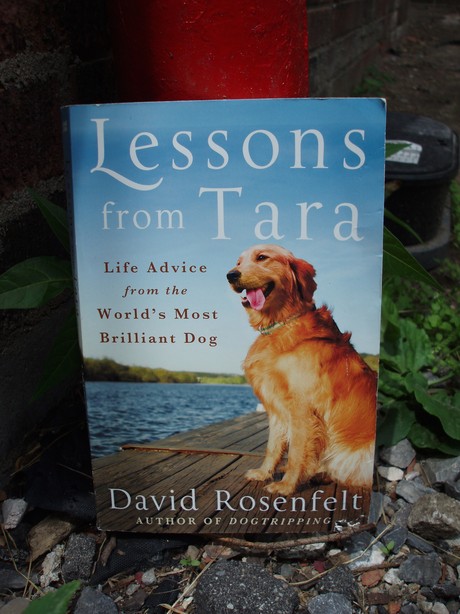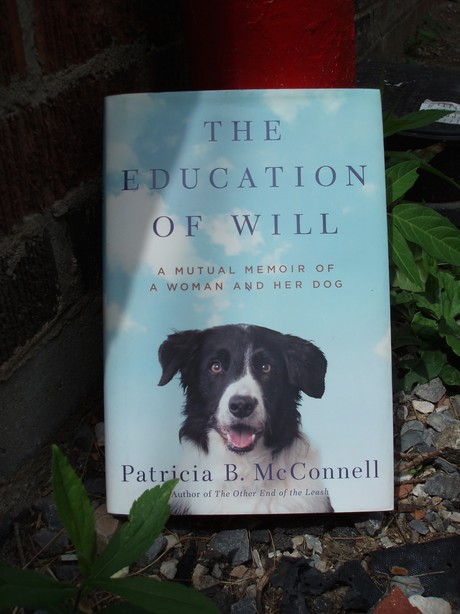Relationship rescue
book reviews of Lessons from Tara and The Education of Will

Photo by Ryan McGuire, Gratisography.
I read books about dogs to learn new ways to think about the species (my noble motive) and to compare my life to other dog people's (my narcissistic one). I usually cry intermittently while reading them, even if I'm on public transit. This summer I've sobbed my way through two great books, although only the second was a real tearjerker: Lessons From Tara, by popular mystery writer and remarkable dog rescue guy, David Rosenfelt, and The Education of Will, by animal behaviourist extraordinaire Patricia B. McConnell.
Rosenfelt's book, subtitled "Life Advice from the World's Most Brilliant Dog," is the lighter of the two. Tara, the author's late, beloved golden retriever, is his main muse, but not his only one. Rosenfelt and his wife, Debbie Myers, have rescued 4000 dogs, and usually live with between 20 and 40. They try to keep it under 40, since to live with more, according to Rosenfelt, "is slightly eccentric."

The book is a range of tips, courtesy of Rosenfelt's canine crowd, from "how to multitask," to "relationships are weird and very unpredictable." However, it's the overall picture of life with a dog mob — a mostly geriatric, large breed, and medically challenged mob — that captivates. The rhythms of the household, the vet visits, the pack politics; the 250 lbs. of kibble purchased every ten days, transported in the "shitmobile," and the super strong pick up bags required. David Rosenfelt tells all.
And it's all weirdly familiar, even if you live with only three dogs, as I do, or one, as do most of my friends. Because Rosenfelt knows the truth: "dog lovers" and "dog lunatics" are interchangeable phrases. Rosenfelt's just another dog devotee: he, too, wonders if he's giving his dogs the best kind of care; appreciates (and resists) how they open his emotional floodgates; and is ticked off when his vacuum cleaners are completely kaput after only six months. It's life with dogs, only on an epic scale.
The moments of chaos and overwhelm you've experienced with your own dogs may seem, in retrospect and in comparison, overblown. Unless you, like Rosenfelt, have fled from a wildfire with 27 dogs in tow, or have collapsed from septic shock after a five hour round trip to pick up rescues, or have driven cross country with 25 dogs, 11 volunteers and 3RVs (an experience more fully documented in Rosenfelt's earilier book Dogtripping). Unless you're that kind of lunatic.
In addition to insights about life with a pack of thirty — probably grad student ethologists should intern in Rosenfelt's backyard — I gained a much better understanding of rescue work. After a couple of failed adoption attempts myself, and after watching prospective adopters do stuff like heighten their backyard fences to meet over-the-top requirements, I was a little snide on the subject of rescues. But Rosenfeld's discussion of rescue work, integrated throughout the book, is in-depth, witty, and moving. He describes the people, the pets, the shelter systems, the ins and outs of adopting, and the motives and experiences behind the whole shebang. The book gave me a huge respect for rescuers. Even the ones who turned me down.
Like most dog lovers, Rosenfelt feels he gets back much more than he gives, and not just because his household's dog-to-human ratio is 27:2. It's a truism amongst dog people that dogs rescue us as much, or more, as we rescue them. And that's also a central theme in Patricia McConnell's book, The Education of Will. Subtitled "a mutual memoir of a woman and her dog," it could just as easily be subtitled "a mutual rescue."

Not that her dog Will is a rescue; he's a carefully selected purebred border collie. But it turns out that Will needs to be rescued from himself. As a pup, he's a train wreck, with IBS, a surgery-requiring shoulder, a debilitating noise phobia, and an anxious rage directed towards dogs he doesn't know. Along with, of course, moments of being a "perfect ambassador for his species."
From this set up, you might expect a story along the line of 'brilliant behaviourist cures disaster dog' (which she does). But it's more A Tale of Two Traumas: the experience of living and working with the acutely anxious Will triggers McConnell's own unresolved fears. Yes, there's lots of expert advice about how to work with a fearful dog, and perhaps even more about humans healing from trauma. But most compelling is her portrayal of how the mutual attunement between dogs and their humans sometimes spirals downwards, what it's like to be in that space, and how, slowly and tenderly, we move out of it.
McConnell points out that emotions are contagious, and "the boundaries between 'me' and 'others' are not as clear as we humans often think." (Or, as I say to my dogs, "Oh, sure, it looks like we're in separate bodies...") Still, it's humans who have the most agency, dogs who are the more dependent. So it makes sense, when working with a troubled dog, to put the oxygen mask on yourself first — perhaps as soon as you sense any turbulence, well before any crash. One key lesson in McConnell's book is that people (specifically, her clients) often wait until they are too depleted by their dog's problems to have any energy for a treatment plan. Likewise, it takes McConnell herself some time to begin "to see Willie as not so much my therapy dog but the reason I needed therapy."
It's always puzzled me that it's OK for us to get a contact high from dogs' exuberance, but it's frowned upon as a 'boundary issue' when we identify too much with their suffering. I'm not saying such identification is always useful, but it can be. Because she knows Will so deeply, McConnell can see herself more clearly, and experience her own vulnerabilities more fully. For both of them to spiral upwards, McConnell draws on a ton of outside support, makes an immense personal effort, and, of course, works closely with her teacher/nemesis, Will. In the end, she concludes that "being with dogs makes us whole. It doesn't have to be pretty all the time to do that."
In their different ways, both Education and Lessons pay homage to relationship rescues/ rescue relationships. I was impressed, when I was a kid, by cartoons that showed St. Bernards reviving hapless snow storm victims with barrels of brandy. And as an adult I learned that dogs help keep us off the sauce, too (see Caroline Knapp's Pack of Two). Very versatile rescuers, dogs. And smart, passionate, and experienced dog people like David Rosenfelt and Patricia McConnell are very versatile rescuers too. Read their books. But if, like me, you're prone to weeping, don't read them on the subway.
Lessons From Tara: Life Advice from the World's Most Brilliant Dog, by David Rosenfelt. St. Martin's Press, 2015. Also available from the Toronto Public Library.
Check out David Rosenfelt's website, and his mysteries featuring Andy Carpenter, a dog loving attorney:
http://www.davidrosenfelt.com/
The Education of Will: A mutual memoir of a woman and her dog, by Patricia B. McConnell. Atria Books, Simon and Schuster, 2017. Also available from the Toronto Public Library.
Patricia McConnell's blog:
http://www.patriciamcconnell.com/theotherendoftheleash/
A post by McConnell about healing from trauma:
http://www.patriciamcconnell.com/theotherendoftheleash/dogs-and-psychological-trauma
To see more photographs by Ryan McGuire:
http://www.gratisography.com/
Want to make a comment and avoid registering with Disqus? Click on 'join the discussion' and in the name field at the bottom of the form check "I'd rather post as a guest." A name and email address are still required.